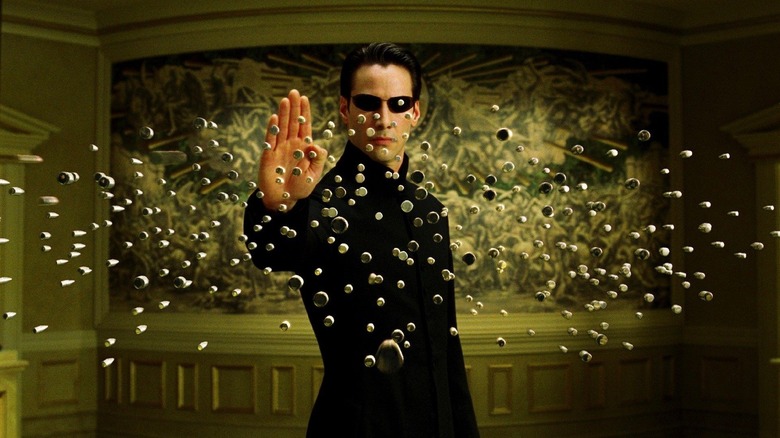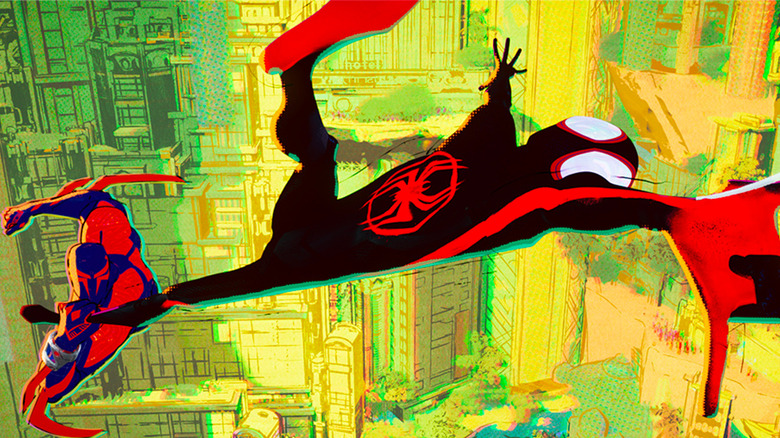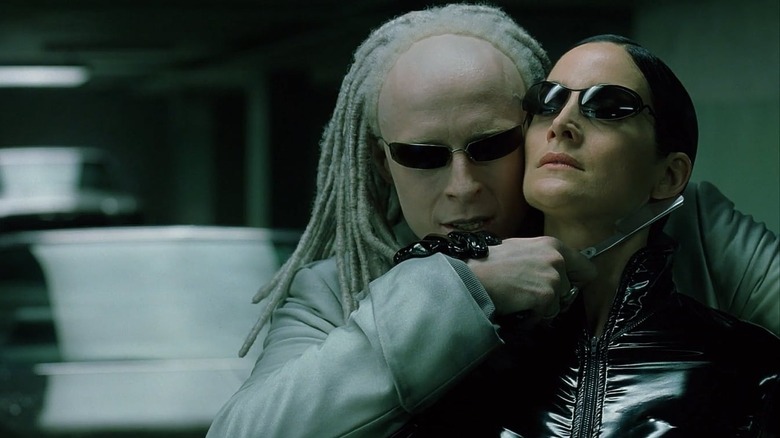Across The Spider-Verse Isn't The Empire Strikes Back Of The Series - It's The Matrix Reloaded
Spoilers for "Spider-Man: Across the Spider-Verse" follow.
There was a brief trend in blockbuster filmmaking in the mid-'00s that produced some of the most overblown sequels ever. "The Matrix" and the "Pirates of the Caribbean" movies were initially big and unexpected hits, each of them rattling the zeitgeist in their own way. Rather than merely make traditional sequels, however, both "The Matrix" and "Pirates of the Caribbean: The Curse of the Black Pearl" offered audiences gigantic two-part mega-sequels, released as two separate features.
The Wachowskis' "The Matrix Reloaded" was released in mid-May of 2003, with a sequel, "The Matrix Revolutions," due the following November. The two films locked together in a massive, sprawling action spectacular that would expand "The Matrix" to apocalyptic territory. "The Matrix" was already a fascinating and heady sci-fi epic that flirted with revolutionary action filmmaking, ideas of gender euphoria and identity, and Cartesian existentialism.
"The Matrix Reloaded" introduced all kinds of new ideas into "Matrix" lore. There was pre-programmed in-Matrix food, the proliferation of an in-Matrix bad guy, and a deeper look at the cave-bound ecstasy raves that humans engaged in outside of the Matrix. The film ended with an intriguing twist: it seemed that the evil machine intelligence in charge of the Matrix deliberately allowed human escapees to stage revolutions on the regular, knowing that rebellion and malcontentedness were a pre-programmed part of the human psyche. The machine who broke this news to Neo (Keanu Reeves) just happened to look exactly like Sigmund Freud.
That theme would not be explored in "Revolutions."
"Spider-Man: Across the Spider-Verse," in terms of its ambitions, visuals, and ideas, is not a dark cliffhanger like "The Empire Strikes Back." It's the first part of a mega-sequel like "The Matrix Reloaded." Also, like "Reloaded," it may prove to be a lesser film than its predecessor.
Across the Matrix-Verse
The parallels between "The Matrix Reloaded" and "Across the Spider-Verse" are myriad.
Both films are much larger and longer than their predecessors, with each upping the action quotient considerably. They are the "high octane" versions of their prequels. "Reloaded" featured a fight scene set on the roofs of speeding cars, all trapped on a homemade freeway. "Across" features a similar action sequence set on the exterior of a speeding sci-fi train that is rocketing straight up into the sky. "Reloaded" featured Neo fighting a whole gaggle of Agent Smith clones, whereas "Across" saw Miles Morales (Shameik Moore) fleeing a gaggle of Spider-Man clones (in one case, quite literally; Ben Reilly is a clone of Peter Parker).
Most notable, however, was both films' tantalizing thematic threads that — in both cases — don't conclude or solidify in a satisfying way. "Reloaded" teased audiences with the idea that escape from the Matrix's insidious machine intelligence may not be possible. It seems that humans, in trying to escape the Matrix and take down their mechanical oppressors, are actually fulfilling a planned "long-game" program set in place long before the revolution began. The machines only care to placate our in-born thirst for rebellion, allowing us to think we've escaped. This was a confrontational idea in a movie that previously celebrated freedom and individuality. "Reloaded" pointed out that even our punk rock impulses can be commodified. Surely that idea, introduced hastily at the film's end, would redefine everything that would come in the planned second part.
Sadly, that revolutionary idea didn't carry into "The Matrix Revolutions" at all. "Revolutions" merely fulfilled complex plot nonsense. The new ideas were kind of dropped, and Neo ended up in a "Dragonball-Z"-like supra-battle instead. For many, this remains disappointing.
Spider-Man Reloaded
"Across the Spider-Verse" presents its hero with a similar, meta-textual existential crisis. Halfway through the film, Spider-Man 2099 (Oscar Isaac) reveals that there are hundreds and hundreds of Spider-People in the multiverse. Because we know the Spider-Man origin story, however, that would mean hundreds and hundreds of Uncle Bens, Gwen Staceys, and other police captains necessarily have to die in order to assure Spider-Man's sense of guilt and righteousness be solidified. This means that Spider-Man 2099 sees when a Spider-Man is about to come into being in a parallel universe, and allows said Uncle Ben to die and said Spider-Man to feel the appropriate level of grief. Once appropriately "superhero-origin-ed," Spider-Man can join the interdimensional club of superheroes.
Miles is startled by the death that Spider-Man 2099 regularly allows to occur. What happened to that whole "with great power comes great responsibility" thing? If Spider-Man 2099 can save Uncle Ben, why doesn't he? Miles argues that one can be a superhero without, essentially, a blood sacrifice. Miles challenges the very notion of the Spider-Man origin story, wanting to redefine heroism on his own terms. Tellingly, Spider-Man 2099 calls the Spider-Man creation matrix "the canon." This is a reference to comic book canon, of course. Miles Morales is questioning Stan Lee's Spider-Man origin story from within.
But — and not to reveal too much — there is a late-film twist that seems to confirm Spider-Man 2099's thesis. The twist presents a new, bleak element into the "Spider-Verse" saga that seems to undermine some of the film's earlier intriguing themes. Sadly, before that twist can be explored or even addressed, the film ends abruptly. "Across," as a result, doesn't feel complete.
Too much, too quickly
When watching "Across the Spider-Verse," one might sense the sinking feeling they experienced with "The Matrix Reloaded." Both present a late-in-the-game twist that redefines what the previous film had been about. "Into the Spider-Verse" was about how anyone with heroism in their soul can become a hero. The twist at the end of "Across the Spider-Verse" argues that there is indeed a sense of fatalism to Spider-Man's universe. Heroes and villains are created by a very strict sense of circumstances, and Spider-Man 2099 was correct in protecting the specific deaths that make Spider-People.
Don't get me wrong, though. Both "Reloaded" and "Across" are virtuosic in terms of their style, their action, and their ambition. Both films are bottomlessly creative, look amazing, and will leave audiences staggering out of the theater will all-new cinematic visuals pouring from their overflowing eyeballs. Indeed, both films might even leave some people a little visually exhausted, having bombarded them with so much creativity compacted into one place. The visuals alone might leave many feeling they have ingested something hearty and substantive.
"Across the Spider-Verse" is in a precarious place. If its intended second part — to be called "Spider-Man: Beyond the Spider-Verse" — addresses its twist intelligently, then "Across" will evade disappointment. If, like "The Matrix Revolutions," it skews toward plot and mythology, then perhaps the "Spider-Verse" movies will be relegated to well-regarded but ultimately inferior follow-ups to a striking and revolutionary original.
We'll have to wait until March of 2024 to know for sure.



